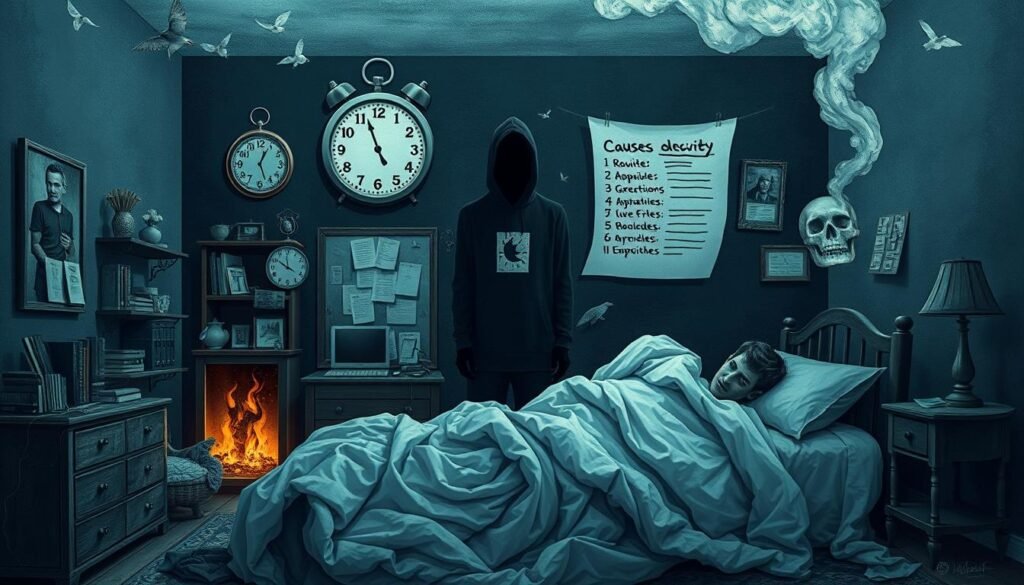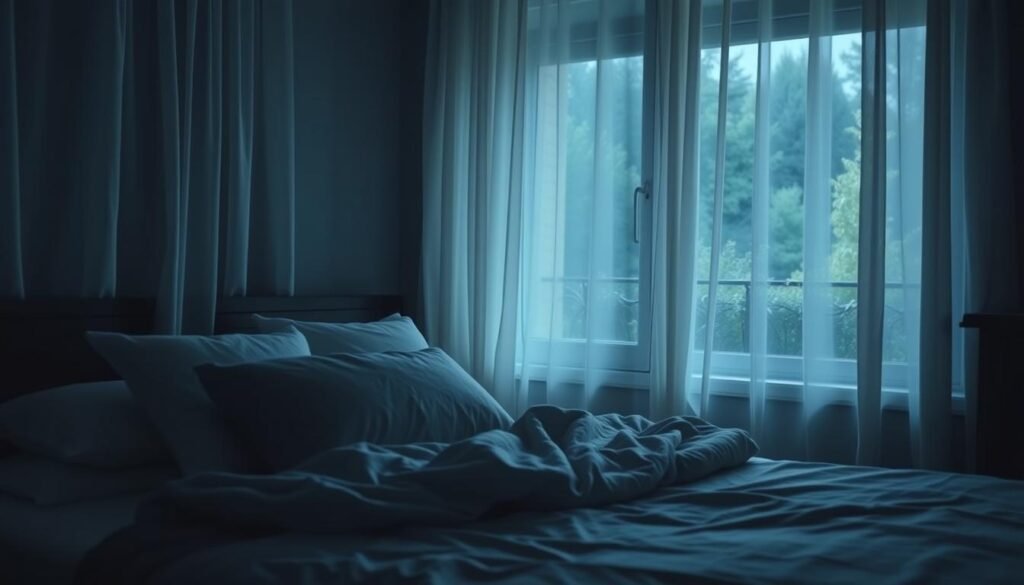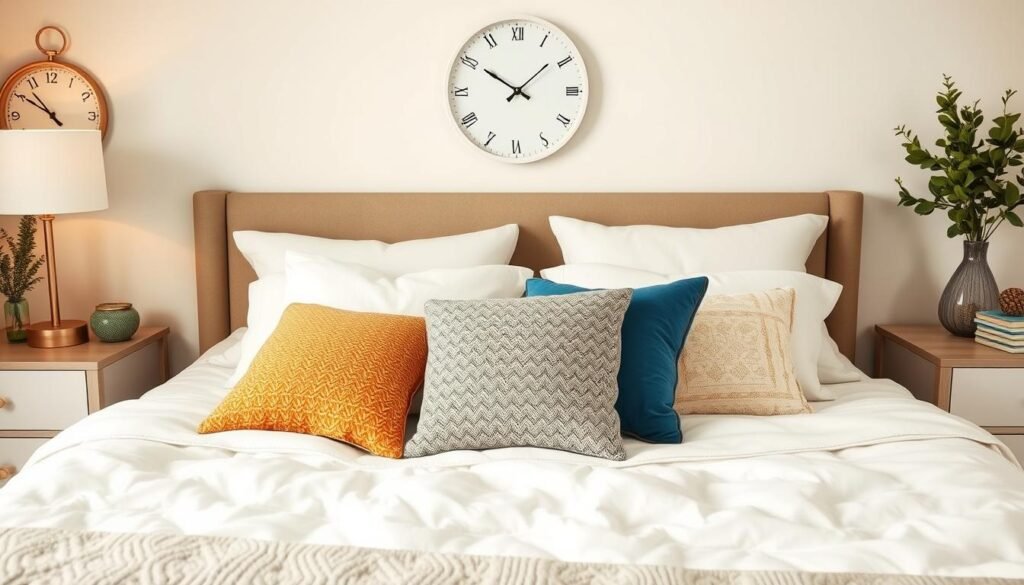Did you know 44 percent of adults have trouble sleeping because of stress? This fact shows how common insomnia and anxiety are today. Poor sleep affects personal health and family life. It’s key to understand how they link to each other. Good sleep is vital for mental well-being. Luckily, there are ways to sleep better and manage stress.
Handling insomnia and anxiety needs kind advice. This article will explore why people can’t sleep. It will also say why sleep matters for mental health and how to reduce anxiety. The goal is to help you sleep better.
Key Takeaways
- Insomnia often goes hand in hand with anxiety and stress.
- Quality sleep significantly impacts mental health.
- Relaxation techniques can improve sleep quality.
- Establishing a consistent sleep routine is crucial.
- Daytime activities and fresh air are beneficial for sleep.
- Seeking professional help can be a game changer for insomnia.
Understanding Insomnia
Insomnia is a common issue that makes it hard to fall asleep and stay asleep. It can greatly impact daily life. Some people have trouble sleeping occasionally. Others suffer from chronic insomnia. Understanding this problem is crucial, as it affects millions worldwide.
Several causes of insomnia exist. These include stress and health problems. Anxiety disorders can make sleeping difficult. Studies show that conditions like obstructive sleep apnea can lead to anxiety and depression. For those with post-traumatic stress disorder, chronic nightmares can disrupt sleep.
Treatment for insomnia includes various medications. Some are available by prescription. Others can be bought over the counter. Here’s a list of common medications:
| Type of Medication | Examples |
|---|---|
| Benzodiazepines | Estazolam, Quazepam, Temazepam, Triazolam (Halcion®) |
| Z-drugs | Eszopiclone (Lunesta®), Zaleplon (Sonata®), Zolpidem (Ambien®) |
| Dual Orexin Receptor Antagonists (DORAs) | Suvorexant (Belsomra®), Lemborexant (Dayvigo®), Daridorexant (Quviviq®) |
| Antiseizure Medications | Gabapentin (Neurontin®), Pregabalin (Lyrica®) |
| Sedating Antidepressants | Tricyclic Antidepressants (TCAs), Trazodone |
| Melatonin-related Drugs | Ramelteon (Rozerem®) |
| Antihistamines | Diphenhydramine (Benadryl®), Doxylamine (Unisom®) |
There are also alternative treatments. These include herbal supplements and cognitive behavioral therapy. But be careful. Some herbs can cause side effects or affect other medicines.
Insomnia is very common, affecting 1 in 3 adults. Knowing and understanding its effects is important for health. Addressing the causes of insomnia can help manage it. This can lead to better sleep quality.
What Causes Insomnia and Anxiety?
Many Americans feel caught in a cycle of insomnia and anxiety. Stress often gets the blame for sleep troubles. Mental Health America says that stress leads to sleep loss for nearly two-thirds of people. This stress can come from many places, like mental health problems, health issues, and everyday worries.
Twenty percent of American adults have anxiety disorders. Around 36% of those also struggle with insomnia. This shows how our minds, when overthinking and worrying too much, can disturb our sleep. It’s especially true at night.
Our minds play a big part in why we can’t sleep. Anxiety stops us from relaxing and keeps our minds active. A 2021 study found that better sleep really helps lower anxiety, depression, and stress. Knowing what triggers our sleep problems can help us deal with them better.
Healthcare professionals often recommend Cognitive Behavioral Therapy for Insomnia (CBT-I). CBT-I tackles the root problems of insomnia without medicines. It suggests keeping a regular sleep schedule, skipping naps, and cutting down on caffeine to help sleep better and reduce anxiety.
If you’re dealing with insomnia or anxiety, it’s important to seek medical advice. The right diagnosis and treatment can really improve your mental health and sleep.

| Trigger | Effect on Sleep | Recommendations for Management |
|---|---|---|
| Stress | Can lead to difficulty falling and staying asleep | Practice relaxation techniques |
| Anxiety Disorders | Often results in insomnia, creating a vicious cycle | Cognitive Behavioral Therapy for Insomnia |
| Poor Sleep Hygiene | Contributes to poor sleep quality | Maintain consistent sleep patterns |
| Health Issues | Conditions like arthritis can disrupt sleep | Consult a healthcare professional for treatment options |
Importance of Sleep for Mental Health
Quality sleep is vital for our mental health. Many studies show that most people with depression struggle to sleep well. About 75% of depressive individuals have sleep issues. These problems can make negative feelings worse, like being more tired, easily upset, and losing drive. Lack of sleep doesn’t just affect our mood; it also hurts our thinking skills and overall happiness.
Anxiety disorders and sleep have a close connection too. Around 20% of American adults deal with anxiety, and not sleeping well can make it worse. Those who often sleep badly are more likely to face anxiety issues. This shows how important good sleep is for managing our emotions and keeping our minds sharp.
The link between sleep and mental health is key. Many U.S. veterans with PTSD from combat have trouble sleeping. This points out the need to solve sleep problems in people at risk. Using treatments like Cognitive Behavioral Therapy for insomnia (CBT-I) helps improve sleep. And better sleep leads to better mental health.
Good sleep habits can lessen sleep deprivation’s bad effects. By valuing sleep hygiene and raising sleep’s importance, we can boost mental health in all groups. Studies back this, showing benefits like sharper focus, steadier emotions, and more satisfaction in life.
| Consequences of Sleep Deprivation | Impact on Mental Health |
|---|---|
| Poor concentration | Increased risk of anxiety and depression |
| Fatigue | Reduced motivation and productivity |
| Memory lapses | Impaired cognitive function |
| Irritability | Negative emotional responses to stressors |

How Much Sleep Do You Really Need?
Knowing how much sleep you need can really help you feel better. Many think that eight hours is perfect for everyone. But this idea doesn’t fit everyone’s unique sleep needs, which can depend on age and how you live your day.

Newborns need a lot of sleep, around 14 to 17 hours every day. Toddlers need between 11 to 14 hours. As kids get older, the amount of sleep they need goes down:
| Age Group | Recommended Sleep Duration |
|---|---|
| Newborns | 14–17 hours |
| Infants | 12–15 hours |
| Toddlers | 11–14 hours |
| Preschoolers | 10–13 hours |
| School-aged Children | 9–11 hours |
| Teenagers | 8–10 hours |
| Adults | 7–9 hours |
| Older Adults | 7–8 hours |
Many adults, especially those over 60, struggle with insomnia. Sleep apnea is a problem where breathing stops and starts. It can raise the risk of high blood pressure. Getting enough rest is very important for older adults, especially if they have Alzheimer’s, which affects sleep.
Good sleep is key to a healthy life and strong mental health. Finding out how much sleep you need helps you stay awake and do better during the day. If you have trouble sleeping for more than a few weeks, it’s a good idea to see a doctor. They can help find out the problem and make a sleep plan just for you.
For more tips on good sleep habits, check out this resource.
Tips for Managing Insomnia and Anxiety
Many people struggle with both anxiety and insomnia. These issues can be closely linked. To tackle them, try relaxation methods and a soothing bedtime routine. This improves sleep and decreases anxiety.
Practice Relaxation Techniques
Relaxation techniques can reduce anxiety and help you sleep better. Methods like mindfulness, muscle relaxation, and deep breathing are very helpful. Doing these regularly can ease anxiety and make sleeping easier.
Deep breaths can calm you and slow your heart rate, helping you fall asleep. Soothing music or gentle yoga can also calm anxiety. They can make going to sleep smoother.
Establish a Calming Bedtime Routine
Having a calming bedtime routine is key for better sleep and less anxiety. This could be reading, a warm bath, or drinking herbal tea before bed. Staying away from screens for an hour before sleep can also help. Plus, having a regular sleep schedule helps a lot.
Changes like avoiding caffeine and big meals before bed improve sleep. Lifestyle changes have a big positive impact on sleep quality.
| Relaxation Technique | Benefits |
|---|---|
| Mindfulness Meditation | Reduces stress and enhances focus |
| Progressive Muscle Relaxation | Alleviates physical tension |
| Deep Breathing Exercises | Promotes relaxation and lowers heart rate |
| Gentle Yoga Stretches | Improves flexibility and reduces anxiety |
Connecting Your Bedroom with Sleep
A well-optimized sleep environment is key to beating insomnia. It’s important to make your bedroom a place for rest. Doing things like only sleeping in your bed makes your brain link the bedroom with relaxation.
Keeping the room between 60 to 72 degrees Fahrenheit is best for deep sleep. Bright lights before bed can make it hard to sleep, as they stop melatonin from being made. Melatonin is what tells our bodies it’s time to sleep. Watching screens before bed is bad too, because the blue light messes with sleep.
Choosing bedding made from things like cotton, silk, or bamboo can make sleep better. These fabrics help keep your body at the right temperature. To block out light, think about getting blackout curtains or a sleep mask.
When picking mattresses and pillows, it’s smart to follow expert advice. A medium-firm mattress is often best for sleep. Pillows should fit the curve of your neck and work with how you sleep.
| Recommendation | Details |
|---|---|
| Optimal Temperature | 60 to 72 degrees Fahrenheit |
| Bedding Fabrics | Cotton, silk, bamboo, linen (for moisture-wicking) |
| Mattress Life Span | Replace every 5 to 7 years |
| Pillow Types | Memory foam, latex, buckwheat (for extended life) |
| Curtains | Blackout curtains recommended for light blocking |
Linking your bedroom with peaceful sleep can really help your sleep habits. Making your space just for rest can make your sleep better. This also helps with mental health issues like anxiety and insomnia.
Creating a New Sleep Routine
Getting good sleep starts with a consistent routine. A calming bedtime ritual prepares your mind and body for rest. Try to go to bed and wake up at the same time every day, even on weekends.
A bedtime routine not only adds structure but also helps you get good rest. It usually takes 30 to 60 minutes and might include:
- Turning off screens to reduce blue light and help produce melatonin.
- Doing relaxation techniques like deep breathing or meditation.
- Listening to calming music or ambient sounds.
- Setting up your bedroom by adjusting the temperature, dimming the lights, and using soothing scents.
- Taking a warm bath around an hour before bed to relax.
- Having a light snack or drinking non-caffeinated herbal tea like chamomile.
- Reading a book under soft lighting to create a calm atmosphere.
- Journaling thoughts or making a to-do list to clear your mind.
Having a place dedicated to sleep makes your brain connect bed with sleep. Climbing into bed should be the last step of your routine. Also, think about what you eat and your activity levels.
Avoid big meals and hard workouts right before bed.
These tips not only help you create good sleep habits but also make your sleep quality better. They show caring for yourself is key in handling sleep issues. Stick with it, and soon, a helpful sleep routine will come naturally, making restful nights more likely.
| Activity | Purpose | Recommended Timing |
|---|---|---|
| Turn off screens | Reduce blue light exposure | 1-2 hours before bedtime |
| Warm bath | Promote relaxation | 1 hour before bedtime |
| Light snack | Induce sleep | 30 minutes before bedtime |
| Reading | Calm the mind | 20-30 minutes before bedtime |
| Journaling | Clear thoughts | 15 minutes before bedtime |
Getting Professional Help for Insomnia and Anxiety
Knowing when to get help for chronic insomnia and anxiety is crucial. Cognitive behavioral therapy (CBT) is very effective for these problems. It tackles the root causes of sleep issues. This method helps people change how they think and act about sleep. This change can improve sleep without bad side effects.
If you have ongoing sleep problems, see your primary care doctor. They might refer you to a specialist for custom treatment. You can also see other health professionals like nurse practitioners for advice and help with insomnia.
The number and length of CBT sessions vary depending on each person’s progress. Research shows most people need six to eight CBT sessions for noticeable improvement. This approach doesn’t heavily rely on drugs, which often aren’t the best solution for the long haul. Even though some new sleep meds are approved for longer use, their risks can overshadow their benefits for insomnia.
In some cases, insomnia connects to mental health issues like anxiety or depression. Then, seeing a psychiatrist might be needed. Neurologists specializing in sleep medicine can also help, especially with insomnia related to neurological issues. Sleep technicians play a key role in sleep studies, ensuring safety and comfort for patients.
If you’re struggling with sleep, getting help from a professional can make a big difference in your life. Strategies like keeping a sleep diary can also help. They let you track what affects your sleep quality. Seeking treatment from experts can boost your health and life quality.
Conclusion
In summary, addressing insomnia and anxiety is key for improved mental health. The article highlighted understanding sleep disorders’ causes. It also showed how a good sleep setting boosts well-being. The connection between insomnia and anxiety is clear. It shows high rates and the need for effective solutions.
The tips to enhance sleep include creating a calming bedtime routine and using relaxation techniques. Making the bedroom good for sleep is also vital. These steps help in beating insomnia and anxiety. Following these tips may improve sleep quality and reduce anxiety symptoms.
Looking ahead, knowing the link between sleep and mental health is vital. Prioritizing sleep and using the outlined tips can boost mental wellness. These small changes can lead to restful nights and calmer days.